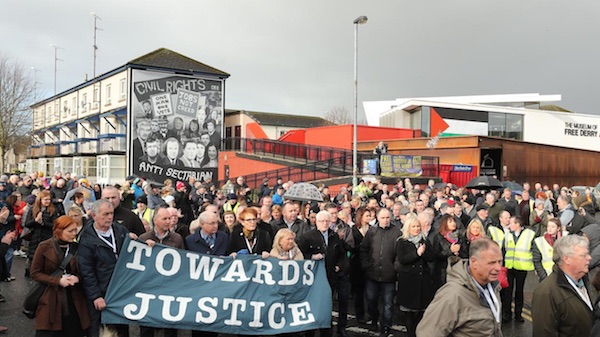
A decision to drop murder charges against a former British soldier in connection with Bloody Sunday is to be quashed, the High Court in Belfast ruled today.
Senior judges directed Crown prosecutors to “reconsider” its decision that the paratrooper known as ‘Soldier F’ should not stand trial for killing two of the fourteen civil rights protestors massaced in Derry 50 years ago.
Justice Siobhan Keegan confirmed: “This is a rare occasion where we consider the decision should be quashed and reconsidered.”
But the court dismissed separate challenges to prosecutors deciding against prosecuting other former British Army soldiers in connection with six of the deaths.
Thirteen people were killed when members of the British Army’s Parachute Regiment opened fire on innocent civil rights demonstrators in Derry on January 30th, 1972. Another of those wounded died later.
Victims’ families brought legal challenges against decisions which meant five of the former paratroopers would not face trial for some of the killings.
In July last year, Crown prosecutors announced they were discontinuing charges against the British soldiers, claiming that certain evidence was inadmissible and that the test for prosecution was no longer met.
While that argument was upheld for the other soldiers, the court reached a different conclusion over the decision to discontinue criminal proceedings against ‘Soldier F’.
Prosecution was recommended, based on a reasonable prospect that third party statements from other soldiers would be admitted at trial.
Justice Keegan stated: “Overall, we do not consider that the rationale for the change of mind which we have set out above is sustainable.
“In our view it strays too far away from the original merits-based assessment of the PPS in circumstances where in fact little if anything of direct relevance to the Soldier F prosecution has changed.”
Confirming that prosecutors should carry out a reassessment in the Soldier F case, the Chief Justice added: “There is a difficulty with the conclusion that the reasonable prospect of conviction previously found had dissipated so that the prosecution should be discontinued at this stage.”
![[Irish Republican News]](https://republican-news.org/graphics/title_gifs/rn.gif)
![[Irish Republican News]](https://republican-news.org/graphics/title_gifs/harp.gif)

